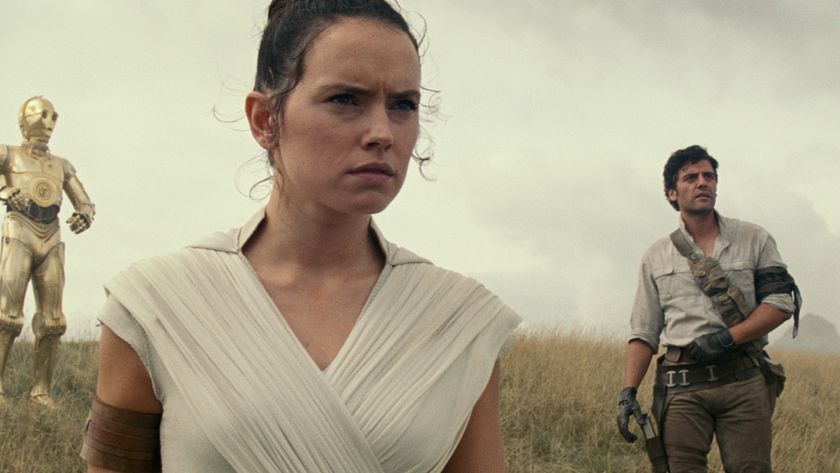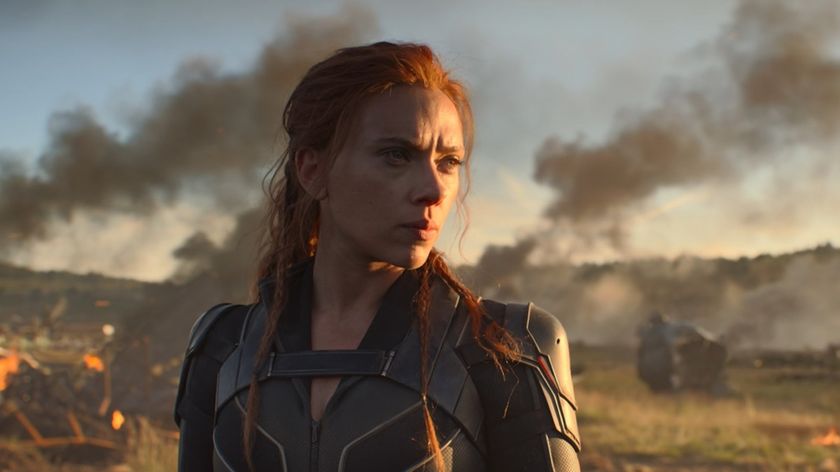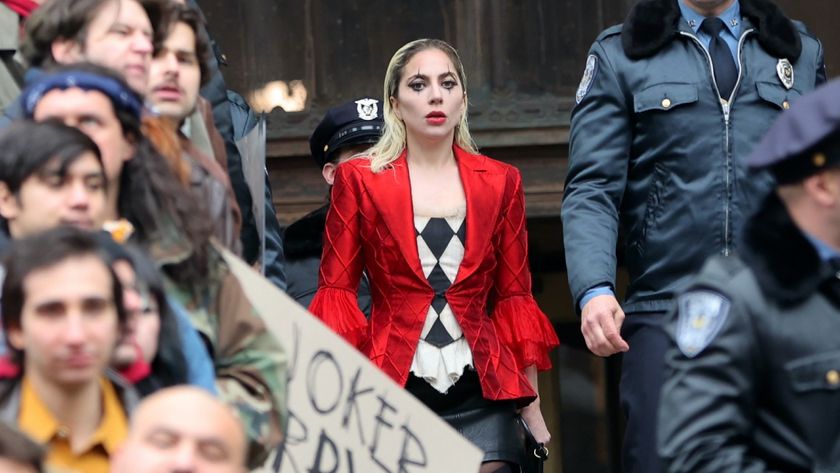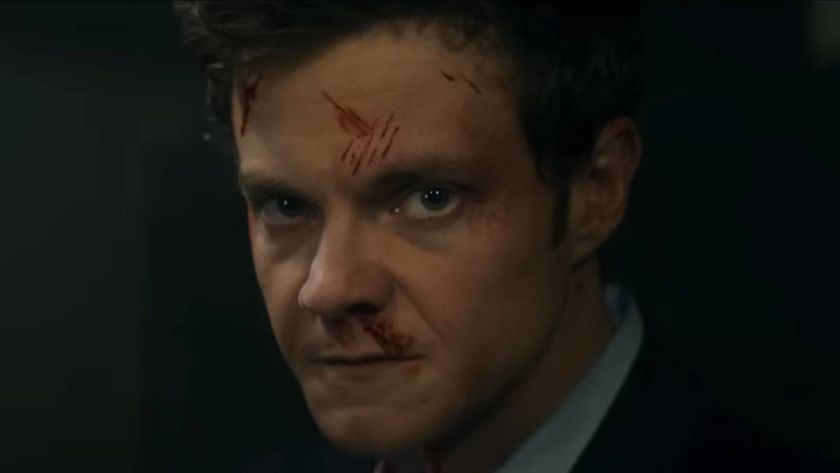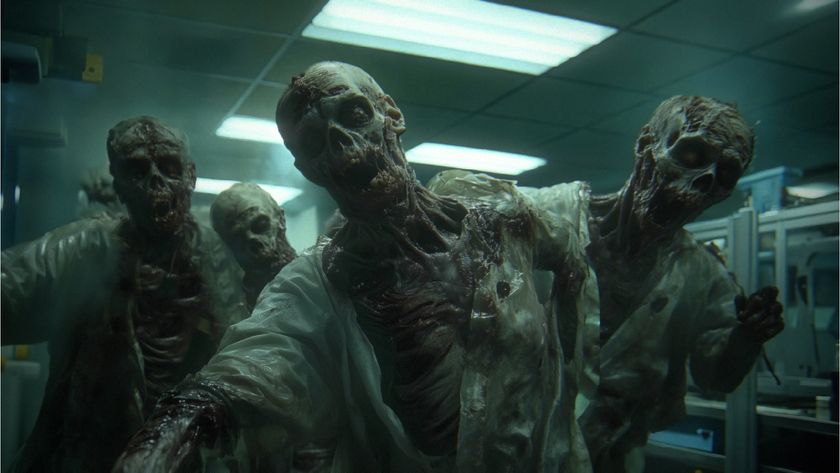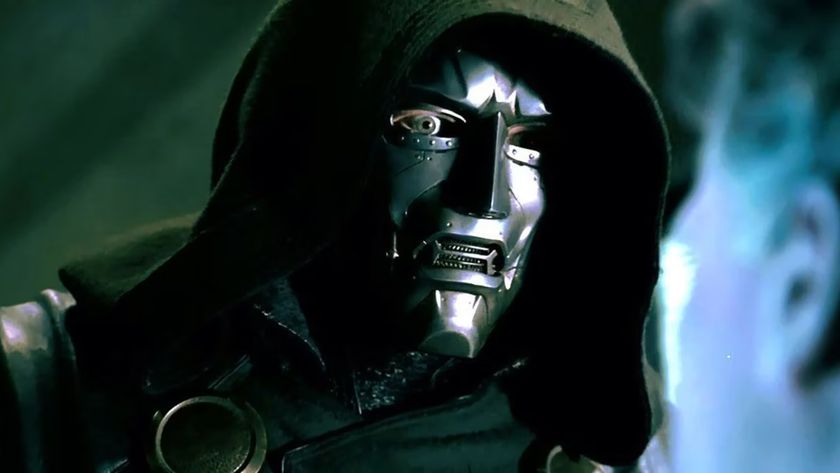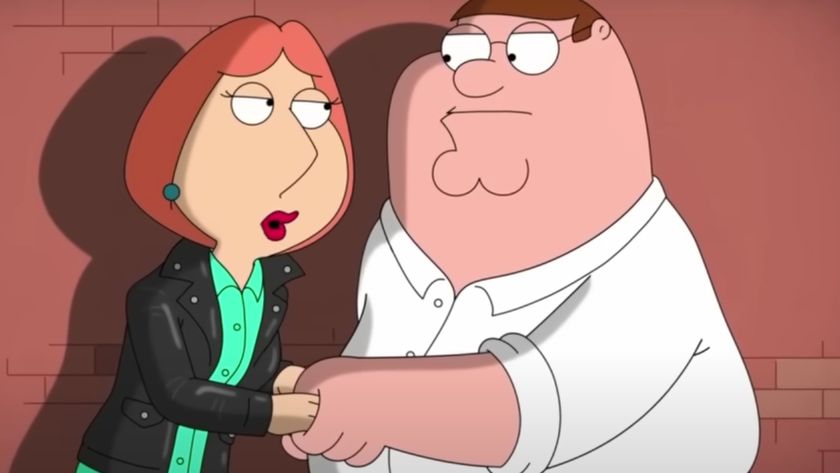The Total Film Interview - Mickey Rourke
Success, excess, sex, drugs and violence. With material to match his life, Sin City proves that Mickey Rourke is back. With a vengeance.
Mickey Rourke is trying very hard. He used to be beautiful. He used to be rich. He used to be… Mickey Rourke. Now he’s a funny-looking cat in love with his dogs – a middle-aged character actor, face battered by boxing, bad decisions and enough plastic surgery to make Joan Rivers blush (if she could). Regrets? He’s got a few. And now he’s trying very hard… to be humble.
“I’ve got to make sure I don’t make the same mistakes again,” he’ll say several times during our interview, hunched puffing Marlboro Reds in a Los Angeles hotel. He means it. Rourke is raw and unsparing in his assessment of how he had it all and “fucking threw it all away”. During his four-and-a-half year stint as a pro-boxer in the early ’90s – after he rejected acting as “not a man’s job” – Rourke was undefeated (nine wins, two draws). But he took a helluva beating. Broken cheekbones, knuckles, ribs… And now he beats up on himself verbally, damning the “jerk-off” he was: the millionaire ’80s movie star who didn’t know the name of his agent or accountant; the street tough whose macho bullshit blinded him to using his talent to make his mark. This was the man who – after electrifying in the likes of Diner, The Pope Of Greenwich Village and Angel Heart – cosied up to Hell’s Angels and gangsters (John Gotti, for one) and chose Wild Orchid while turning down Platoon, Rain Man and Pulp Fiction. Who was arrested in 1994 for knocking about his junkie-model missus, Carré Otis (she later dropped the charges). For this Catholic boy, interview is confession. But with Sin City, he’s beginning to feel he’s finally paid penance. With good reason. As Marv, the bruising, busted-up thug at the centre of Frank Miller’s graphic noir masterpiece, Rourke is outstanding.
“With Mickey, I was dealing with a force of nature,” concedes Miller, of working with the once notoriously volatile star. “I never knew what was going to come out of him. There would be a couple of takes where he seemed to not be into it at all, but all of a sudden I would see something go over his face and I’d just say, ‘He’s going in, make sure you get this.’ And he would be brilliant.”
Endearing and intimidating, charismatic and frightening – it’s little wonder Miller scribbled at their first meeting, “Mickey IS Marv.” The character’s hard-boiled, self-lacerating dialogue? It could be Mickey’s own: “Hell is waking up every goddamn morning and not knowing why you’re even here.” / “When you’ve got a condition it’s bad to forget your medicine.” / “There’s no choices left and I’m ready for war.”
So, Philip Andre Rourke, are you ready for war? “I’m ready for war,” he grins. “Let’s go.”
The character Dwight says of Marv, “He was born in the wrong century. He belongs on some ancient battlefield, swinging an axe into somebody’s face...”
My psychiatrist said that to me on several occasions. We started working together when I decided I needed some help, some guidance, and he said to me, “Mick, your ethics just don’t apply any more. It would have been fine if you had been born 200 years ago. But you don’t need all the armour – you’ve got to strip it away.” Mentally or whatever. Sometimes you can get a little out of control and lose the perspective of how other people see you. I think that happened to me.
Marv is this tough guy, but he has a distinct moral code and a certain tenderness.
You know, I’ve got to be honest with you: at first it was just a physical thing. When Rodriguez first asked me to play Marv, I went and got the comic-book. I had a session with my therapist and, after looking at the comic-book, he said, “That looks like you many years ago.” And I said, “They still see me like this.” I remember the day when I was just sitting on my own in an empty house that I didn’t even own and everything that I loved, thought I loved, was gone. And I can remember looking in the mirror and looking at a guy that looked like Marv. Back then, if I walked into a restaurant, everyone would whisper. And I didn’t want that in my life anymore... But I had fun playing Marv. It’s one of the performances I’m most proud of.
Sign up for the Total Film Newsletter
Bringing all the latest movie news, features, and reviews to your inbox
You don’t tend to watch your movies. Have you seen Sin City?
When I was doing the voiceover I saw the stuff I was in, but I will see this one, because it’s not like looking at all of me, it’s like looking at a part of me. The whole movie’s not me, so I can go see it.
Which other films do you look back on fondly?
The Pope Of Greenwich Village. That was a lot of fun, working with probably the best actor I ever worked with…
...Er, Eric Roberts?
Yeah, one of the most talented actors I worked with. He’s not around much now. That happens. You got to play the game. The politics get in the way of the work. That’s what happened with me. I heard someone say Hollywood’s a celebration of mediocrity, which rings pretty true to me.
Any other happy memories?
I had a very good experience with Michael Cimino on Year Of The Dragon. Alan Parker on Angel Heart. Alan Parker’s a tremendous director, one of the best directors of actors I’ve ever been around. And Francis Coppola, I worked with him on Rumble Fish and he gave me a shot again, on The Rainmaker. I appreciated that.
Do people still come up to you because of 9½ Weeks?
I had a girl come up to me the other night and say, “Are you the guy from that movie?” She was Russian. I was like, “How old are you?” She said, “18.” I said, “Yeah, I’m that guy!” But, I mean, I wish I could say that it was pleasant, but… The stuff you do so far back, you just let it go, and when someone mentions it to me now, it’s like, “Fuck, why are they talking about that?” With 9 Weeks, it’s guys who always come up and say, “I got laid or I got a blow job watching that movie.” I’ve heard that 10,000 times.
Which you probably don’t appreciate...
No. I never got laid because of that movie. There was a lot of shit that went on during that time. That was a crazy time in my life, where I could’ve handled things a lot better than I did. I disappointed myself and could’ve handled my career a lot differently and things would’ve been a lot smoother. I didn’t. I wanted to go the opposite way. I wasn’t interested in being Mel Gibson.
What do you mean?
I came out of the Actor’s Studio [Lee Strasberg’s Method-teaching school] and I was really interested in stretching myself as an actor and going off and doing roles where the material wasn’t safe. I wanted to be able to go and do a movie like Barfly whether it was going to be really good or a piece of shit, and then go over to Ireland and do a movie about an IRA guy [A Prayer For The Dying], when that was not a popular subject matter, instead of just doing a formula commercial movie at the studio. Maybe I should’ve tried that.
But instead you quit and turned to boxing. Why?
Well, I was a boxer before I was an actor and I wanted to do it one more time. So I took five years off and went all through Europe and Asia. I did that for me because I always enjoyed sports more than I did acting. I used to play a lot of baseball and I missed the competitiveness of sports because there’s not much competition as an actor. I wanted to do it competitively one more time, but because it was boxing, it sort of backfired in the industry because they looked at it as something more destructive. I mean, there were a lot of other things that I could’ve done that were more unhealthy than to go back and box. And, yeah, I got nicked up a little bit and this, that and the other… But still, I didn’t look at it as anything destructive.
What was the worst beating you took?
I remember fighting this kid from Jamaica in Miami. It was about my ninth fight. He was a lot. I remember in the first round, I hit him with a right hand and he didn’t blink. I was like, “Oh fuck, this is going to be a long night.” There was a lot of pressure on me because I was fighting at home. I remember in the fifth round I turned to my corner and my trainer said, “Goddamn it, you ought to go back to acting!” Then he slapped me and said, “Go in there, and knock him out.” And I almost did. But I can’t believe that he actually said that to me.
There was one point, in the fourth, when I was getting my ass kicked a little bit, and a funny thought came to me in the middle of it. I was against the ropes, getting a body shot, and I went, “Oh fuck, that hurt.” And I’m thinking, “What the fuck am I doing here?” I mean, I actually thought, “How the fuck did I end up here?” After my last fight, it was like the 11th – I only had 11 fights in four-and-a-half years – the pressure became too much because I was known as an actor. I had a record where I had to start fighting a better quality of fighters if I wanted to take that next step up. But it would’ve been another three years fighting and the damage… So I made that decision to stop. But it was very hard to get work for three or four years because I was unbondable and I think that it scared a lot of people.
It’s been a long road back.
It’s been a fucking long road back. And when you’ve been on the bench for over 10 years like I have, you’re very gun-shy of even saying you’re back. People go, “Travolta had a big comeback…” Well, yeah, but he didn’t raise fucking hell for 15 years, you know? He was welcomed back with both arms. There’s politics involved with me, too. It’s not just the work.
You did burn a lot of bridges back in the day...
Yeah, you know, I admit that and I can’t blame anybody but myself. But I was very famous for my exploits off the screen, notorious for that kinda shit, and right now I just want to be acknowledged for my work. I don’t want to be known for the crap I did 10 years ago off screen. Address me as the man I am now, the actor – what I’m doing from project to project. But people like that whole other bullshit; they like to hold on to that.
Well, they’re good stories, you know?
I paid the price dearly for that. It was my fault, I was angry and crazy and running around pointing my finger at everyone but the asshole that I saw in the mirror. You finally wake up one day when the bottom has fallen out and you realise it wasn’t his fault, it wasn’t her fault, it was that jerk-off in the mirror whose fault it was.
Was there literally a point where you woke up and thought, “What the hell have I done?”
You know, to be honest, I’d lost all my money, I’d lost my wife, I’d lost my fucking career, I’d finished up with the boxing. There was nothing to fucking do. I couldn’t get a job, and you’ve got to go back and start again. Everything’s gone. You can’t put the blame on anybody, you’ve got to take a look in the mirror. I thought I could turn it around in six months and it’s been almost 10 fucking years. I’ve just got to be consistent with what my priorities are and consistent with my behaviour. It’s never been about the acting with me, it’s never been about the drugs or the alcohol. It’s been about my mouth, my temper and my lifestyle off the set. You pay the price when you have no rules. I’ve got rules now, you know… goals.
Let’s talk about your ‘comeback’. After small roles in The Pledge and Animal Factory, Spun gave you a major role and was pretty important...
Animal Factory was fun. Steve Buscemi didn’t know what was coming at him, but it was fun. But Spun? I couldn’t stand making that movie. I hated every second of it.
It felt like a bunch of kids playing dress-up and you were the only one who’d been there, done that...
That’s how I felt. I mean, Jesus Christ… My agent represents the director and he forced me to do the movie. He said it would be good for my career. He goes purple when I talk about Spun that way, but it was like pulling fucking teeth every day just to go to work.
What do you intend to do next?
You know, here’s the deal: I’ve come back to acting after a few years and I’ve realised I can’t make the same mistakes I’ve made in the past. Now I live within my means, so I don’t need to take a job for money. Whereas before, if I was behind the eightball, then I would take a project for the money and end up working with some stiff that I didn’t respect. Now I really only want to work with material that has integrity, and with actors and directors that I respect. You know, people like Tony Scott, Robert Rodriguez, Quentin Tarantino – there’s a shortlist. I’ve been offered several jobs since I did Domino with Tony Scott, but the material wasn’t right and the directors weren’t right. I want to stay enthusiastic with acting again and work with the right people, so I don’t make the same mistakes again. I have to be consistent with that, because if I work with someone that I don’t respect then all hell’s gonna break loose.
The Total Film team are made up of the finest minds in all of film journalism. They are: Editor Jane Crowther, Deputy Editor Matt Maytum, Reviews Ed Matthew Leyland, News Editor Jordan Farley, and Online Editor Emily Murray. Expect exclusive news, reviews, features, and more from the team behind the smarter movie magazine.
